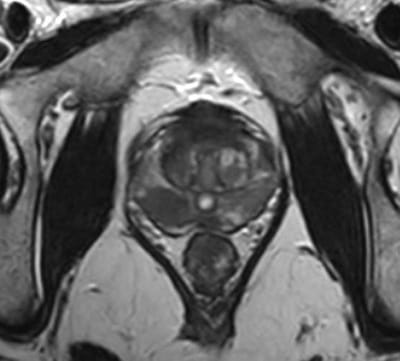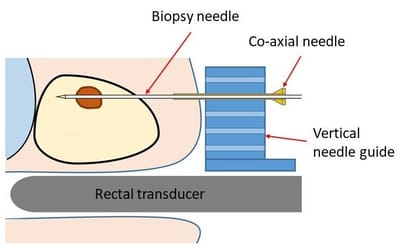Prostate biopsy (transperineal)


Tissue samples are taken from the prostate using a needle. An ultrasound probe in the rectum (back passage) will guide the needle into the correct location within the prostate. Procedure time is usually 10 minutes under local anaesthesia. Samples are sent for analysis and results available in 1-2 weeks. If you have cancer, the result will inform us on the location, amount, and type of cancer.
What happens during a prostate biopsy?
You will lie on your back with your legs suspended in stirrups. A rectal ultrasound probe is inserted. The the area of skin behind the scrotum is anaesthetised and a biopsy needle is positioned next to the prostate. Samples will be taken from the suspicious area in the prostate (usually based on MRI findings), as well as from the surround areas of the prostate. In total, around 20 samples will be taken and sent for analysis.
How likely is the risk of cancer?
The risk of cancer for people having biopsy ranges between 20-90% which depends on the MRI appearance as well as your PSA result.
Could a small cancer be missed on biopsy?
Small cancers seen on MRI are more difficult to sample and could be missed on biopsy. We have extensive experience in performing difficult biopsies and pride ourselves to take highly accurate and precise biopsies to avoid missing the cancer.
What happens immediately after biopsy?
After the biopsy you will be required to stay for 1 hour and encouraged to pass urine before you go home. You must not drive for 6 hours after the biopsy.
What are the side effects of biopsy?
Typically you will notice blood in the urine for up to 1 week, blood in the ejaculate up to 1 month, and skin bruising of the scrotum. In very rare cases (around 1 in 1000 cases) you may suffer an infection or need a temporary urethral catheter after the biopsy. If you feel unwell after biopsy you must attend A&E or seek advice from us if less urgent.
When will I get my results?
We will arrange for discussion of results within 1-2 weeks after your biopsy.